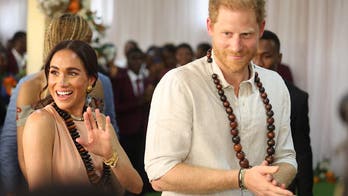'Masterchef Junior' hopefuls rise to a challenge
Contestants try hard to focus on the task at hand
Kids have become the hottest commodity on reality television — but at what price?
Precocious, cute-as-a-button participants, some as young as eight, have lured millions of viewers to shows like “MasterChef Junior,” “Child Genius” and “Are You Smarter Than A 5th Grader?”
Now — as NBC begins production on the new variety series “Little Big Shots” and Lifetime prepares to debut “Project Runway Junior” on November 12 — some experts are again questioning the long-term impact on children whose lives are suddenly thrust in front of a worldwide audience.
“The actual work may, in fact, be quite fun and the compensation levels might be rewarding, but who is looking at [their well-being over] the next 10 years?” asks Paul Petersen, a former child star of “The Donna Reed Show” and head of the child advocacy group A Minor Consideration.
Petersen and 800 other former youth actors and athletes continue to lobby the United States Department of Labor to ban participants under 18 from any type of reality TV production until a clear set of “national standards” can be adopted.
“We are trying to guarantee a safe and protected workplace with limited hours, oversight by a licensed professional mandated to report abuse, and guaranteed set-asides so the children have something if for nothing other than their therapy bills when they turn 18,” Petersen says.
The majority of broadcast network shows (think: “American Idol”) are produced in California under state guidelines designed to ensure underage participants receive on-set schooling and have their earnings kept beyond the reach of unscrupulous guardians.
But for years, loosely scripted documentary-style programs like “Kid Nation,” “Here Comes Honey Boo Boo” and “Jon & Kate Plus Eight” set up production with non-union crews in states where there was little or no regulation to ensure fair treatment of young talent.
“Many children on reality shows historically have not been paid,” Petersen says.
Compensation, however, is of secondary importance to many young hopefuls on performance and variety driven shows like “The Voice” or “America’s Got Talent.”
“The money isn’t the reason you are doing these shows,” notes Bob Sonenclar, whose daughter Carly Rose was a finalist on season two of “The X Factor” at age 13.
“You are trying to raise your profile. You are trying to get discovered.”
John Hotchkiss, an executive producer on the 2008 series “My Dad Is Better Than Your Dad,” says he now believes kids should be kept away from the camera altogether until they are old enough to understand “what it means to be on television.”
“You think you know what it means to be on TV, but you don’t know what the production company is going to do when they edit [the show],” he tells FOX411. “You don’t know where it is going to be broadcast or for how long. If you are the awkward kid on a TV show or the kid that messed up the scrambled eggs, that could follow you around for the rest of your life.”
Long term psychological damage and self-esteem issues should not be underestimated, says Erica Spiegelman, wellness expert and author of “Rewired: A Bold New Approach To Addiction and Recovery.”
“I really believe that there are long-term issues that can come out of being too competitive at a young age,” she tells FOX411. “A show like ‘Toddlers and Tiaras’ which is a competition based on looks is going to be very psychologically damaging versus something like ‘MasterChef Junior,’ which is a little bit more healthy.”
The newest wave of kiddie competition shows do appear, by many accounts, to be taking more steps to protect their young participants from exploitive or embarrassing situations.
Most shows now employ on-set psychologists to counsel young contestants about how to handle the pressure of appearing on national television.
“Going into it, my daughter knew there would be ups and downs,” Sonenclar tells FOX411. “[Today] she is very happy and leads a normal life. The experience hasn’t been damaging to her psyche at all.”
“MasterChef Junior” has taken the additional step of eliminating children in groups of two or more so no one feels singled out.
“There was definitely a lot of support there,” says Mark Weiss, whose 12 year-old son Alexander was the show’s first winner in 2013. “The entire production team was really wonderful and looked out for all the kids.”
Alexander, like many “MasterChef Junior” contestants, walked away from his experience with life-long friends who all share a common interest in cooking.
“The kids would do their filming during the day and at night they would all swim in the hotel pool together,” Weiss says. “It was like they were all best friends.”
John Hesling, CEO or Shed Media, described a similar sense of camaraderie and social acceptance on the set of Lifetime’s “Child Genius.”
“Some of the children are home schooled and because they are so advanced, they are in classes with people 10 years older than them,” he told TheTVPage.com in January. “Some of them don’t have friends their age but what they got from it, when they came to the competition, is that suddenly they were coming across children who were like them.
“There were 9-year-olds having incredible games of speed chess or competing over who knows the most decimal points of Pi.
“Obviously there is drama and excitement on the program,” he says. There is tears and laughter… [But] It is not an exploitative show.”







